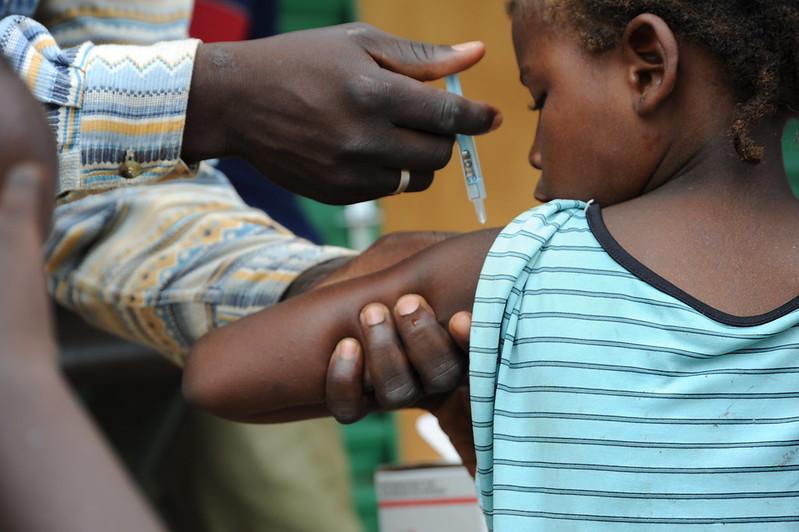The results of a phase 3 randomized clinical trial support the use of a vaccine that protects against five strains of meningitis in routine childhood immunization programs in countries with a high burden of meningococcal disease, an international team of researchers reported yesterday in The Lancet.
The trial, conducted in babies and toddlers aged 9 and 15 months in Mali, aimed to assess the safety and immunogenicity of NmCV-5, a single-dose, five-valent meningococcal conjugate vaccine, compared with the quadrivalent (four-strain) MenACWY-TT vaccine when co-administered with routine childhood vaccines.
Previous trials have shown that NmCV-5, which targets Neisseria meningitidis serogroups A, C, Y, W, and X, is safe and produces a robust immune response against all five serotypes in children over 12 months of age and adults. This trial was one of three phase 3 trials planned to assess the vaccine in children younger than 12 months and provide evidence to incorporate the vaccine into routine immunization programs for infants.
Mali is one of the 26 countries in a region of sub-Saharan Africa known as the meningitis belt, where rates of meningitis incidence are high and large-scale epidemics occur every 5 to 12 years. Because of the rapid onset of invasive bacterial meningitis, and the difficulties in accessing healthcare in the region, death rates can surpass 15%.
Although the introduction of the monovalent MenAfriVac vaccine in 2010 has led to the virtual elimination of meningitis caused by serogroup A disease, the region still experiences outbreaks and epidemics of meningitis primarily caused by serogroups C, W, and X. Developed by Serum Institute of India and PATH, NmCV-5 is the first vaccine to include serogroup X.
"This study represents a necessary evaluation of this vaccine to satisfy the conditions for its use within the Expanded Program on Immunization [EIP] and protect new birth cohorts," the investigators wrote.
NmCV-5 safe, non-inferior to MenACWY
From March 24 to August 15, 2022, the investigators enrolled and randomized 1,200 infants who had completed their EIP vaccines to receive a meningitis vaccine at either 9 month (600 infants) or 15 months (600 infants) of age. In both groups, the participants were randomized 2:1 to receive either NmCV-5 or MenACWY-TT. The primary end point of the trial was seroprotective response for all five serotypes in both age-groups, with a non-inferiority margin of –10%.
In both age-groups, the difference in seroprotective responses for NmCV-5 were non-inferior to MenACWY-TT. In the 9-month-old group, the difference in seroprotection prevalence for NmCV-5 relative to MenACWY was 0.0% (95% confidence interval [CI], –1.0% to 2.0%) for serogroup A, –0.5% (95% CI, –2.3% to 1.9%) for serogroup C, –3.0% (95% CI, –6.3% to 0.8%) for serogroup W, and –3.0% (95% CI, –5.4% to –0.4%) for serogroup Y. For serogroup X, non-inferiority was assessed relative to seroprotection for serogroup W in participants who received MenACWY-TT, with a difference of 2.3% (95% CI, 0.3% to 4.7%).
Among the participants who received NmCV-5 at age 15 months relative to participants who received MenACWY-TT, the difference in the prevalence of seroprotection was 0.8% (95% CI, –0.6% to 3.7%) for serogroup A, –0.8% (95% CI, –3.3% to 2.5%) for serogroup C, 0.3% (95% CI, –1.8% to 3.5%) for serogroup W, and 1.4% (95% CI, –0.6% to 4.8%) for serogroup Y. For serogroup X, non-inferiority was assessed in relation to seroprotection for serogroup Y in participants who received MenACWY-TT, with a difference of 1.9% (95% CI, 0.0% to 4.4%).
A total of six adverse events were recorded in the trial, but none were related to vaccination.
The study authors say the results suggest NmCV-5 should be introduced in sub-Saharan Africa for further elimination of meningococcal disease.
'Reassuring evidence'
"This critical clinical study provides reassuring evidence that this pentavalent vaccine can be safely and effectively given along with other routine immunizations, which makes it far easier to curtail invasive meningococcal disease and potentially save tens of thousands of lives," trial protocol chair Wilbur Chen, MD, of the University of Maryland School of Medicine's Center for Vaccine Development and Global Health, said in a university press release.
The results of the trial were included in the evidence base for the World Health Organization's October 2023 decision to recommend that countries in the meningitis belt introduce NmCV-5 into their routine immunization programs. In April 2024, Nigeria became the first country to roll out the vaccine.
This critical clinical study provides reassuring evidence that this pentavalent vaccine can be safely and effectively given along with other routine immunizations, which makes it far easier to curtail invasive meningococcal disease and potentially save tens of thousands of lives.
In an accompanying commentary, experts from the University of Cambridge and Centre Suisse de Recherches Scientifique en Cote d'Ivoire say the results provide hope that the NmCV-5 vaccine can do for serogroups C, W, Y, and X what the MenA conjugate vaccine did for serogroup A. They also note that the vaccine's affordability—approximately $3 per dose—could ensure its use at a public health scale.
"NmCV-5 can revolutionise meningitis control in Africa, and efforts now must ensure that it is used at a scale that enables this effect," they wrote.


















